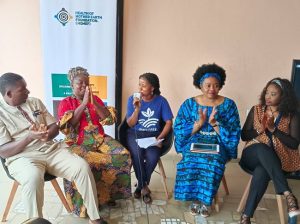Inarguably, the development of a nation largely depends on its food system because food security is important to the individual and to the nation; it is one of the basic necessities of life.

Agriculture experts and economists believe that any country which cannot guarantee food security can never be said to be a sovereign nation in other ramifications.
It is, therefore, due to this reality that stakeholders at a recent National Convergence and Food Fair in Benin City, the Edo State capital, canvassed a food system that is safe, healthy and sustainable for Nigeria.
Food system refers to all the elements and activities related to producing and consuming food, and their effects, including economic, health, and environmental outcomes.
The event was organised by the Health of Mother Earth Foundation (HOMEF) to celebrate Nigeria’s food, cultural diversity and rich biodiversity.
At the event, stakeholders expressed serious concern about the high influx of Genetically Modified Organisms (GMO) into the country’s food production, thereby eroding the traditional ways of farming, which they adjudged healthier, safer and sustainable.
Genetically modified (GM) foods, also known as genetically engineered (GE) foods, or bioengineered foods, are edibles produced from organisms that have had changes introduced into their DNA.
Genetic engineering techniques allow for the introduction of new traits as well as greater control over traits when compared to previous methods, such as selective breeding and mutation breeding.
Nnimmo Bassey, Director of HOMEF, said it was appalling the way Nigeria’s food system is challenged in recent years, particularly with the introduction of these GMOs into crop production.
“People are planting what they don’t know and they are eating what they don’t know. We believe the health of Nigerians is being compromised this way; also compromising the health of the environment.
“At the end of the day, Nigerians are exposed to the erosion of our culture, of our biodiversity and indeed our heritage.
“The government should take steps to avoid promotion of monoculture or a kind of agriculture that is not based on biological diversity,” Bassey said.
During a panel discussion, Mrs Lovelyn Ejim, a farmer and founder, Network of Women and Youth in Agriculture, said it had been found that GMO activities had impacted on the health of the people as well as the wealth of farmers.
She said GM seeds ranging from maize, beans and rice had permeated Nigeria’s food system as a result of free distribution, whereas traditional seeds remained the healthier and more sustainable alternative.
Ejim, South East Vice-President of Rice Farmers’ Association of Nigeria (RIFAN), urged farmers never to give in, but to return to the planting of indigenous crops that are nearly going into extinction.
Corroborating Ejim’s stance, Prof. Tatfeng Mirabeau of the Niger Delta University, Wilberforce Island, Bayelsa State, advocated the revival of traditional seeds.
“I am happy to learn that there are banks where our traditional seeds are maintained. Farmers need to strive to get those traditional seeds.
“We should also get ourselves acquainted with agroecology; which is a natural system of growing our crops; making use of our ecological requirements and our agricultural system.
“We should learn how to fortify our soil; learn how to recycle our crops at every season and so on and so forth.
Prof Mirabeau dismissed the idea that organic farming is ineffective in tackling global food insecurity.
“It is fallacious that through organic farming, we can’t feed the world. We need to explore what God has given agriculture is healthier for us and safer for our environment.”
To be able to sustain the efficacy of organic seeds and seedlings, Dr. Jackie Ikeotuonye of the BFA Integrative Health and Wellness Centre, advocated the practice of crop rotation.
“We know that in the southern region, we have a lot of virgin land.
“The percentage of land under use now in the whole southern region for agricultural activities from the last count of ratio is just 30 per cent.”
Policies on organic farming, Dr. Ikeotuonye said, was not the problem in Nigeria. “We have enough policies; implementation is the problem. So, we are not talking about policies anymore, it is the implementation.”
Stakeholders emphasised an “eco-regenerating” lifestyle, which means general consciousness of our environment and its biodiversity.
They also demanded more information on GMOs so that Nigerians would know what they are eating, saying if they can’t be thoroughly explained then they are not the solution to hunger in Africa.
In his presentation on pesticide use and precautions in Nigeria, Donald Ofoegbu, Programme Manager, Heinrich-Böll-Stiftung, said over 58 per cent of the pesticides used by farmers in the country are already banned in Europe for health and environmental reasons.
“There is poor regulation, poor monitoring system in terms of how these pesticides are traded; how they are used. A lot of farmers do not even know what they are using.
“It means there is a need for caution. They need to be very conscious about what pesticides should be used in the country.
“Farmers’ associations should do a lot more in terms of sensitising their members. Community leaders and religious groups should also be involved,” Ofoegbu said.
Ofoegbu, who is the Lead Coordinator, Alliance for Action on Pesticide in Nigeria (AAPN), said the safest and most sustainable farming system is going organic.
By Usman Aliyu, News Agency of Nigeria (NAN)
